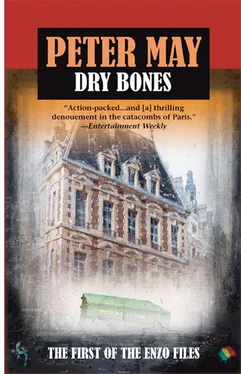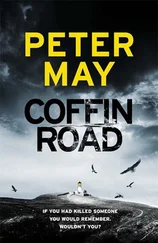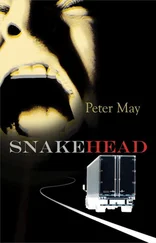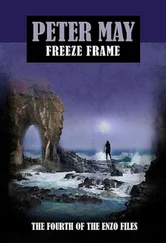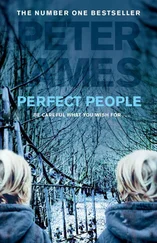‘He was my uncle.’
Enzo felt his anger simmering and bubbling inside him. He fought to keep it from boiling over. ‘You lied to me.’
‘I didn’t lie to you. I didn’t tell you, that’s all.’
‘You lied by omission. It’s the same thing.’
‘Oh, crap!’ She pushed brusquely past him and out into the kitchen again. He followed her. She said, ‘I just met you a week ago. I didn’t know you. And I certainly didn’t owe you. The truth or anything else.’
‘Does Raffin know?’
‘Of course he does. That’s how I met him. When he was researching the book.’
A tiny explosion of air escaped from the back of Enzo’s throat. ‘Oh, right. Of course. It all becomes clear. You got involved with Raffin because you thought you might learn something about what happened to your uncle. But when he failed to come up with anything you didn’t already know, you dumped him. Just as I appeared on the scene promising to take a fresh look.’
‘It wasn’t like that.’ She folded her arms across her chest and faced him off.
‘Well, tell me how it was, then.’
She glared at him, angry and defiant and defensive. ‘I never thought for a minute that Roger was going to turn up anything new about my Uncle Jacques. I fell for him, that’s all. I thought he was charming and funny, and we had great sex.’
Enzo almost flinched. This was more than he wanted to know.
‘I dumped him because I got to know him. After that first flush of infatuation, I discovered that the more I knew him the less I liked him. It happens all the time. You meet someone. You think they’re great. Then you find out they’re not as great as you thought they were, and you move on.’
‘To me.’
She shook her head. ‘It was you who asked me up for coffee, remember?’
‘No. You asked yourself. And you’re the one who kept turning up at my door. Not that I wasn’t happy to see you. But it was you who came to Épernay. It was you who got the key to my room, you who got into my bed.’
She was only able to meet his angry gaze for a moment before she turned away. ‘You were the first person in ten years who seemed like he might actually find out what happened to my Uncle Jacques. And I wanted to be around when you did.’ She swung back to face him, vindication burning in her eyes. ‘I loved that man. A lot of people didn’t. I don’t know why. Because to me he was the kindest, sweetest, gentlest person. And someone just took him away from me. Wiped him off the face of the earth, without reason, without trace.’
‘So you used me.’
‘Yes.’
Enzo felt the bottom falling out of his world.
‘Not that I didn’t find you attractive.’
‘Oh, please!’
‘But, yes, I thought there was a good chance you might turn up something new.’ She drew a deep breath. ‘And then I got to know you. And the more I got to know you the more I got to like you. Just the opposite of how it was with Roger.’
‘You don’t know me at all.’ This was hurting more than he had thought it would.
‘I know enough to know that you make me feel like I’ve never felt before about any man.’
But Enzo didn’t want to hear it. This could only get worse. He started lowering the portcullis. ‘You know what I think?’ He answered his own question. ‘I think you use people. I think you used Raffin, and I think you’re using me. And when this is all over I’ll be nothing more to you than a piece of history.’
She looked at him with her big, dark eyes, like some wounded animal. Full of hurt and incomprehension. She shook her head slowly. ‘You’re wrong, Enzo.’
And suddenly the fire of their argument was extinguished, as if a salamander had come between them and put out the flames. Enzo felt spent. He walked past her and out into the early afternoon sunshine. The heat was building, and he felt the sun burning his skin. He thrust his hands in his pockets and walked off through the long grass choking the garden, until he found a stone bench placed so that it gave on to an undisturbed panorama of the valley below. He felt the stone hot through his trousers as he sat down, and he closed his eyes. The air was filled with the sound of a million humming insects, and then the church bell chimed one. It was extraordinary, he thought, how a single hour could change your life.
And in that moment of introspection, as anger subsided, the first doubts crept in to undermine his self-righteous certainty. Had he, after all, judged her too hastily, too harshly? He opened his eyes to the full glare of the sun and knew that whatever the truth, it was too late now to unsay the things that had been said.
He had no idea how long he sat there staring out over the Cère valley with its hills and gorges and tangling forests. It seemed like forever, but the church bell had not yet struck two. Ten minutes earlier he had heard the distant chatter of Charlotte’s printer, and now he caught a movement out of the corner of his eye, and turned to see her wading through the grass towards him. She was wearing jeans and a large, shapeless tee shirt with a faded Bart Simpson head on it. A sheaf of papers was fluttering in her trailing hand. She stopped a meter short of him, and he looked up to see that she had been crying. Her eyes were bloodshot and watery, and sadness was smudged in the shadows beneath them. But she looked at him without emotion.
‘Get over it.’ She held out a sheet of paper.
‘What’s this?’
‘I got to thinking about the clues again,’ she said. ‘It seemed a little more constructive than sitting about feeling sorry for myself.’
Enzo ignored the barb. ‘And?’
‘And, I got to thinking about those dates. 1927 to 1960. They seemed kind of like the dates you see in brackets after the name of someone who’s dead. A life span.’
‘A short life. Just thirty-three.’
‘He was.’
‘Who?’
She pushed the sheet of paper at him. ‘See for yourself. I just put the dates into the search engine and that’s what came up.’
Enzo glanced at the printout, squinting at it in the bright sunlight. DAVID DIOP — POET (1927–1960). It was an entry on a page of the library section of the University of Florida website. Diop had been born in Bordeaux, the son of a Senegalese father, and his work had reflected a deep hatred of colonialism in Africa. Killed in a plane crash in 1960, most of his poetry had been destroyed with him, leaving for posterity only the twenty-two poems published before his death.
He looked up at Charlotte. ‘So? He had a Senegalese father.’
‘So I looked at that list of Schoelcher students you got from ENA.’ She held it out to him. ‘I’ve marked the name with a highlighter.’
He looked at the green, highlighted name on the list. François Diop. And through the mist of blood and anger and pain which had clouded his last hour, an extraordinary clarity emerged. The dates engraved on the salamander. François Premier. Africa. Senegal. All leading incontrovertibly to the name of another of Jacques Gaillard’s students. François Diop. He turned shining eyes on Charlotte, and for the moment everything that had passed between them was forgotten. ‘What do we know about him?’
She shrugged. ‘I haven’t looked yet.’
* * *
He wrote François Diop up on the board, circled it, and drew arrows to it from everything else, except the cup and the whistle. ‘Okay, so we know who, but not where.’ He crossed to the kitchen table and picked up the group photo of the Schoelcher Promotion. There were four black faces amongst them. One of them was François Diop, and François Diop had tried to murder him. Of that he was certain. But he had not got a clear enough sight of the face to be able to recognise him. Certainly not from a tiny image in a ten-year-old photograph. ‘Have you found anything yet?’
Читать дальше
